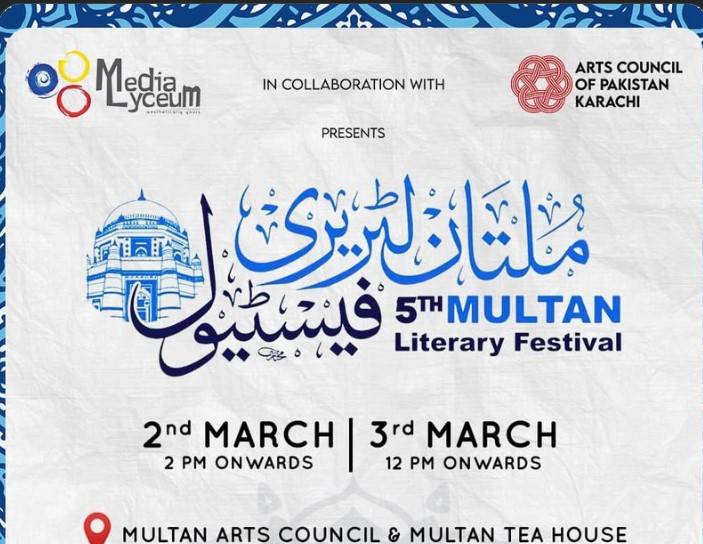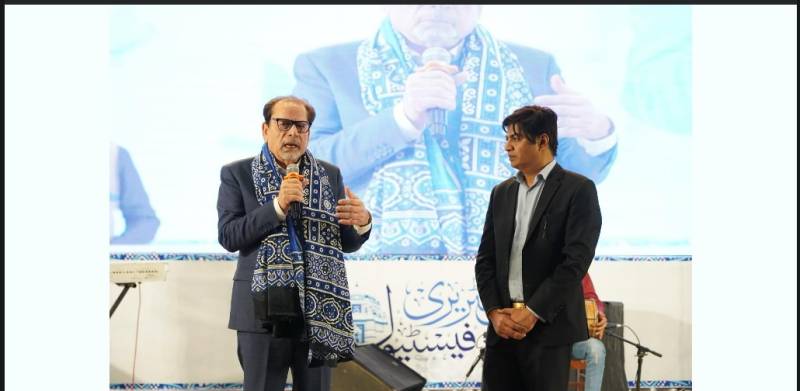Several years ago, I was sitting with my friend Ali Naqvi and we were discussing the ideas of doing something different in the city. It was decided to organize a literary festival in Multan. The idea was new for Multan, but at the same time, many festivals were taking place across Pakistan, particularly in Karachi, Lahore and Islamabad. Ali further shared this initiative with his elder brother and some friends in Multan and post discussion, it was unanimously decided to do the first Multan Literary Festival in Multan.
After a successful first edition, it was decided to do this every year with the intention of adding more colour to it. I must admit that the passion and the commitment shown by Ali Naqvi, his elder brother and their families since organizing the first festival till now is remarkable indeed.
This year marked the fifth Literary Festival for Multan and this time one of the collaborators was the Arts Council of Pakistan Karachi. Ahmed Shah sahib took a great interest and due to his passion for art and culture, he made a firm commitment to come with all his team and to become a permanent part of this Festival. Another partner, equally important, was the Media Lyceum. The venue for this festival was the auditorium of the Multan Arts Council and all their team members played a significant role, in making this festival a successful and memorable one.
So, what makes a good festival? A starting point must be a line-up of the excellent speakers with something different to say and the ability to provoke thought and stimulate ideas and the debate. It is no good just having a great book, but there is also a need for a great theme. The target audience was covered, as the administration of this festival went to meet with all the people across Multan and in the other cities of the South Punjab. It's more than likely that they will have attended literature festivals in the past and have their own ideas on how to make the event a success. The arrangements for the guests were also superb and very well managed.
The two day schedule was shared all across the digital media and a follow up was done continuously. It was designed in a way to cater all the significant literary aspects with a presence of the speakers. It included the sessions on literature, the importance of the written word and the role of literature in a changing world, the current global crisis, the importance of film, radio, TV and other forms, the historical aspects of literature and culture in Pakistan, the significance of the novel in a changing environment and more. Esteemed guests included Wusutullah Khan, Noor ul Huda Shah, Harris Khalique, Anwar Shaour, Umar Cheema, Hina Shafqat, Salman Shahid, Ameera Javeria and more. The Mushaira was also an important part of this festival in which the prominent poets presented with their poems and it was much acknowledged by the participants.
The Open Mic was also arranged at Multan Tea House to give the participants a chance to come on the stage and present their talent. The Music Festival was arranged on the second day and the great artist Saeen Zahoor and others were presented. Part of the fun of such a festival is meeting friends, bumping into acquaintances and even better striking up conversations with new people with a shared interest. These festivals also encourage people to spontaneously attend events that they might have otherwise overlooked.
The desirability of diversity returns as a constant theme both in terms of subject matter and speakers. Some festivals are much more gender and ethnically diverse than others. The Multan Literature Festival is outstanding in this regard. No one wants tokenism but surely it must be critical to have what Tanya Bruce-Lockhart, director of Bridport Literary Festival describes as an ‘eclectic cast of writers’ talking on a myriad of subjects.
Gratitude goes to Ahmed Shah Sb, Ali Naqvi, their teams, Multan Arts Council Team and the people of Multan for making this festival a successful event and as announced by Ahmed Shah sahib, to continue doing this and to bring a larger festival to Multan in the near future is indeed very remarkable. Such a literary festival has become a remarkable platform in Multan, representing the powerful voice of the South Punjab and across Pakistan. There is always hope to have more festivals to cater against the extremism through the vibrant colours of the festival and to bring the change, by transforming Pakistan to become a pluralistic Society by holding the values of humanism and to fight against all forms of discrimination.



